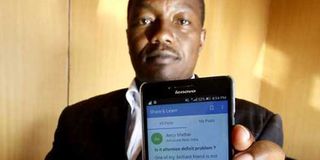New mobile app to help mental health patients get psychiatric help anonymously

Mr Iregi Mwenja, the director of the Psychiatric Disability Organisation, explains how the TrustCircle app works during the interview in Nakuru. The app allows mental health patients access psychiatric services securely and anonymously. PHOTO | SULEIMAN MBATIAH | NATION MEDIA GROUP
What you need to know:
- He said this is a step in ensuring that psychological support and psychiatry services will no longer be a preserve of the rich but instead for [all] Kenyans who need it.
- Mwenja noted that Kenya has 88 psychiatrists, most of them based in Nairobi adding that the psychiatrist to citizen ratio is 1:5,000,000 in rural areas.
- This poorly compares to the internationally accepted ratio of 1:10,000.
- In the next three years, PDO is planning to make the mobile app available to all the 12 million Kenyans who will need it.
A Nakuru community-based organisation (CBO) has launched a software application that will allow mental health patients access online psychiatric and psychological services from local and global health providers.
Psychiatric Disability Organisation (PDO) founder Iregi Mwenja said the mobile phone-based app is a secure way of discussing personal matters between a patient and an online mental specialist.
“The application dubbed ‘TrustCircle’ gives users an option to remain anonymous whenever they are sharing their stories or consulting with the health providers,” said Mwenja.
He said this is a step in ensuring that psychological support and psychiatry services will no longer be a preserve of the rich but instead for [all] Kenyans who need it.
“TrustCircle Health Solution is a new innovative android mental health App available on Google Play Store to millions of android users in Kenya for free,” he said.
He noted that Kenya has 88 psychiatrists, most of them based in Nairobi adding that the psychiatrist to citizen ratio is 1:5,000,000 in rural areas, which poorly compares to the internationally accepted ratio of 1:10,000.
“The Ministry of Health, while launching the Kenya Mental Health Policy 2015-2030, stated that one in every four Kenyans will suffer from a mental disorder in their lifetime.
The policy states that up to 25 per cent of outpatients and up to 40 per cent of inpatients in health facilities suffer from mental conditions,” he added.
Once a user downloads the app, they get a one-time login password and will afterwards change it to one of their choice.
GET ANSWERS FROM SPECIALISTS
Once logged in, one can access postings by others from Kenya and India where one can ask questions about mental health and will get answers from a specialist.
Those seeking help for mental health-related issued normally face challenges which include long waiting hours and transport expenses.
“A bigger percentage of the population doesn’t realise that they are suffering from mental health and they end up sharing their problems on social media.
“On social media one meets all kinds of people some of whom contribute to escalation of the condition,” said Mr Mwenja.
Currently, Nakuru has only three psychiatrists serving over 3,000 patients.
Mr Mwenja noted that the World Health Organisation puts this gap at 76–85 per cent in the less-developed countries.
“Surprisingly, the same government allocates only 0.1 per cent of its health budget to mental health, creating an unnerving statistic in [the] treatment gap,” he said.
He said that in the next three years, PDO is planning to make the mobile app available to all the 12 million Kenyans who will need it.
The app will also be a game changer in the interaction between health providers and their patients as they will be able to interact remotely without the need to regularly travel to hospital.





